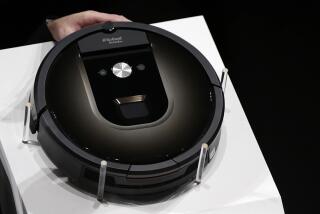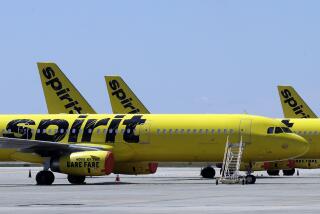China Must Sell U.S. Aircraft Parts Maker, Bush Says : Trade: The order is the first time the takeover of an American firm by a foreign buyer has been blocked since new laws took effect. The President cited national security.
- Share via
WASHINGTON — President Bush, using new emergency powers, moved Friday to nullify the recent sale of a Seattle-based civilian aircraft parts-manufacturing firm to an arm of the Chinese government for fear that it might jeopardize U.S. national security.
While on a visit to Knoxville, Tenn., to highlight high-technology issues, Bush ordered the China National Aero-Technology Import & Export Corp.--known as CATIC--to divest itself of Mamco Manufacturing Co., which it had acquired in November.
The White House said CATIC would have until May 1 to sell Mamco to an acceptable buyer, or face a court order and possible penalties later. In the meantime, the Administration’s high-level Committee on Foreign Investment in the United States, which had urged Friday’s action, will monitor the divestment process.
The action, which followed a unanimous recommendation by the eight-member interagency panel, marked the first time that the U.S. government has blocked the takeover of an American firm by a foreign buyer under provisions of the 1988 Omnibus Trade Act.
White House spokesman Marlin Fitzwater said in a written statement that Bush’s decision was based on “credible confidential information” that continued control of the American firm by China “might threaten to impair the national security.”
He said Bush’s action was tied directly to the circumstances of the case and did not signal any change in America’s traditional openness to foreign investment or in U.S. policies affecting other investments by China.
“The United States welcomes foreign direct investment in this country,” he said.
In a briefing for reporters, Administration officials repeatedly declined to spell out precisely what it was about the sale that so concerned the foreign investment committee, contending that to do so would involve disclosing classified information.
Mamco manufactures brackets and other components used in the manufacture of civilian aircraft. Its major customers are Boeing Co. and McDonnell Douglas Co., which already export airliners to China.
However, U.S. officials said the government had been “very concerned about the past activities” of CATIC, which is the military procurement arm of the Chinese aerospace ministry.
The implication was that U.S. intelligence agencies had compiled evidence that CATIC had previously sought to buy into U.S. firms to gain access to military technology. Officials apparently were afraid that it might use Mamco’s technology for military purposes as well.
The officials said there is no indication that Mamco had done anything to endanger the national security.
Analysts said the decision was expected to have relatively little impact on U.S.-China relations. Had Bush overridden his advisers’ recommendations and approved the sale, it would have heightened tensions with Congress, which wants him to take a harder line.
Officials also took pains to point out that the Administration had explored ways to save at least part of the sale, perhaps by having CATIC divest itself of particular parts of the Mamco operation, as has been done in similar cases before. “We’ve looked at every possible avenue,” one official said.
But the decision provided a dramatic demonstration that the Administration is prepared to block foreign takeovers when it believes that genuine national security issues are at stake--an issue that had remained unresolved until now.
Neither Mamco officials nor spokesmen for the Chinese government were available for comment Friday. A Mamco spokesman said Kenneth A. Keller, the company’s president, was not taking calls.
But the decision received mixed reviews from lawyers involved in representing U.S. and foreign clients in such takeovers.
The case is the first in which the foreign investment committee has recommended that a sale be rolled back. During the 15 months since enactment of the new law, the panel has reviewed 243 foreign takeovers. It has investigated six of these and sent four to Bush for a decision.
More to Read
Inside the business of entertainment
The Wide Shot brings you news, analysis and insights on everything from streaming wars to production — and what it all means for the future.
You may occasionally receive promotional content from the Los Angeles Times.










